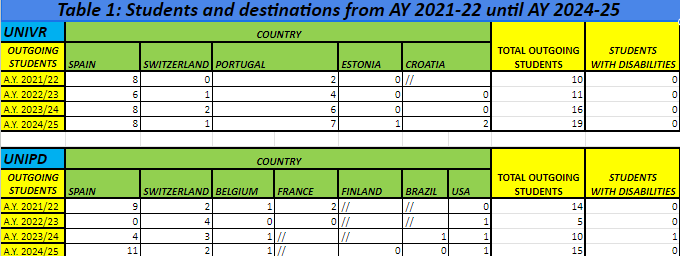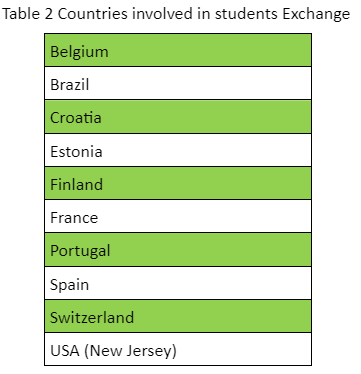Coppola Lucia [Physiotherapy Degree Course, Padua University, Padua, Italy]
Cecchin Enrica [Physiotherapy Degree Course, Verona University, Verona, Italy]
Quinci Antonio [Physiotherapy Degree Course, Padua University, Padua, Italy]
Marini Gabriella [Physiotherapy Degree Course, Padua University, Padua, Italy]
The international process of Italian universities involves exchange student projects between foreign universities and Italian universities of the same study course. In the future, we will have foreign lecturers teaching in Italy and Italian lecturers teaching abroad. Currently, the most stable and widespread form of cultural exchange is the presence of foreign students for varying periods attending classes and internships in the Physiotherapy Degree Programs of universities with established collaborative relationships, known as partner universities.
The international projects that currently involve the two universities in Veneto, the University of Padua and the University of Verona, to which all six Physiotherapy Degree Program locations in Veneto are linked, are Erasmus Plus and Ulysses Overseas. The increasing number of students and the complexity of the educational and administrative processes in each university have necessitated the creation of a dedicated organizational model, which we have decided to present.
We describe the organizational models adopted by the two degree programs to manage outgoing students, excluding the phenomenon of incoming students, which is also present. The number of students, not divided by gender, who have actually departed (and not just won grants) from the 2021-2022 academic year to the allocations for the 2024-2025 academic year for earning curricular credits is recorded. Students who leave after graduation in the first post-graduation year are excluded, even though they still fall under student exchange projects but follow different administrative paths.
The number of students involved is shown in Table 1. The various countries are shown in Table 2. This is followed by a description of the two organizational models.
The Verona Model:
The Physiotherapy Degree Program at the University of Verona is organized into three locations: Verona, Vicenza, and Rovereto (TN), accommodating a total of 240 students, with an intake of 25 students for the Vicenza and Rovereto (TN) branches and 30 students for the Verona branch. In their second year, students can participate in a call for the allocation of Erasmus mobility grants to complete part of their academic program abroad during the third year (ranging from 2 to 4 months, earning a minimum of 12 credits). Students can choose to attend courses at one of the partner university locations or engage in internships, obtaining recognition for the exams and credits earned. This educational opportunity is managed by the International Mobility Office, which reports to the Academic Services and Student Services Directorate. The service collaborates with the Faculty of Medicine’s Internationalization Delegate and an Erasmus Coordinator for all health professions, utilizing contacts for each degree program to manage Erasmus exchange activities with each partner university. For the Physiotherapy Degree Program, it has been decided to maintain the initial single Erasmus Contact, who is also the Coordinator of one of the three academic branches.
The Padua Model:
The Physiotherapy Degree Program at the University of Padua is organized into four locations: Venice, Padua, Schio (VI), and Conegliano (TV). The various locations have different student numbers, totaling 300 students across the first, second, and third years and four locations, all within the Veneto Region. Students participate in Ulysses or Erasmus calls while attending the second year, with departures allowed from the second semester of the third year, having acquired clinical skills to better understand the different working contexts they will encounter outside Italy. This way, they have earned credits for classroom lessons in Italy and will earn a minimum of 12 to a maximum of 18 credits related to internships abroad. In reality, the scholarships include one theoretical exam in conjunction with the internship, so winning students will enroll in a course abroad, attend this course, and complete the internship. However, having already completed classroom training gives students the freedom to attend a course worth 1 credit or more credits abroad, depending on the availability of the foreign location. From the 2023-2024 academic year, it has been possible to participate in a call to complete only the thesis abroad, for a total of 6 credits. Administrative aspects are managed by the International Mobility Office, which reports to the Academic Services and Student Services Directorate.
As an internal organizational model for the Degree Program, there is a Course Internationalization Contact and four persons in charge: each of them (one coordinator and three location tutors) maintains contacts with two foreign university partners. This way, winning students at a location refer to the person managing the foreign location, and over the years, the foreign location can build privileged relationships with a single person in charge.
We can see positive aspects in both models. The Verona model is very linear, as all students, all foreign locations, and the International Mobility Office report to a single person for all exchanges. On the other hand, the workload is placed on a single person. The Padua model is more complex, involving four people, one for each location (Venice, Schio (VI), Conegliano (TV), and Padua), coordinated by the single Internationalization Project Contact for the Degree Program, but the commitment for each person in charge is less.
https://www.unipd.it/en/erasmus-studies-out https://www.univr.it/en/our-services/-/servizi/opportunities-abroad-for-students-and-staff

